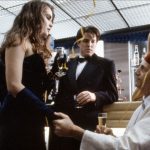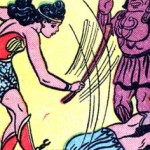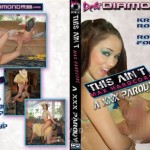The Hooded Utilitarian has a series of posts on the deep, deep psychosexual weirdness of the early Wonder Women comics, mainly from a post-Freudian perspective.
The writer argues that Marston’s ideal of “loving submission” is a parent-child relationship, distinct from the usual patriarchal “rule of law”. It isn’t enough to obey the law and keep your own thoughts; you must love your authority figure (shades of the ending of Orwell’s Nineteen Eighty-Four.)
The impression I get from reading writer Marston’s stories is instability of roles and relationships. Wonder Woman shifts from dynamic omnipotence to helplessness and back in an instant. In one panel, she’s throwing around war profiteers like they were children, in the next, her mother Queen Hippolyta shows up and lifts her up like she’s a child. Harry Peter’s art accentuates this by playing fast and loose with perspective and scale. In the aforementioned scene, Diana is drawn as if she were child-sized relative to Hippolyta.
Ideas like this, of sexuality sublimated into fantasies of mind control, hypnosis, disguises, role-playing, transformation and the like, permeated much of popular culture, waiting to give people their first taste of kink.






